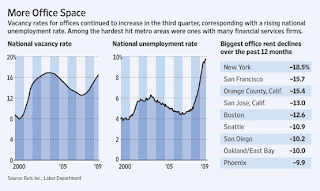Not satisfied with this impressive winning streak, Mr. Duff decided to try to top himself. With much fanfare in March 2008, Mr. Duff founded Duff Capital Advisers LP, claiming it would be bigger than Tiger. He secured $100 million from Lindsay Goldberg, a $10 billion buyout firm in New York, and then promptly blew through all the money in under a year. Most hedge fund start-ups would consider $100 million in investment capital to be a gift worth investing right away, particularly during some of the most volatile and interesting markets we've seen in decades. But no, the $100 million was just working capital for Mr. Duff, that he used to create some fairly spectacular infrastructure for a massive fund, without really bothering to figure out how he was going to raise any capital. Mr. Duff signed a 15-year lease, costing $5.5 million a year, on 43,400 square feet of office space in Greenwich Connecticut. The new digs had a custom food court, two jumbo flat-screen televisions, showers, a boardroom table for 20 and a skylight with panes that filtered bright light to keep traders from squinting. Did I mention Mr. Duff's $39,000 desk? Mr. Duff hired approximately 104 employees and offered some of them lucrative pay packages, although several actually invested in the fund by purchasing shares.
Right before Lehman's collapse, Linsay Goldberg started asking some questions. Well, actually just one important one: Why are you spending so much money and not earning any? They eventually forced Mr. Duff to fire many of his employees and eventually forced him to hand over control of the firm. The firm was renamed Investment Risk Management Group and changed its focus to developing risk analysis tools. The company was strung along until May 21st, when Lindsay Goldberg finished raising its next private equity fund. Cause really, embarrassing failures like this need to be swept under the rug until new investment capital is raised. The private equity concern was forced to settle with some of the former employees over a pay contract dispute, but everyone signed NDAs, so nobody's talking.
Stories of hubris and excess like this sometimes make me thankful for the great recession of 2008. Anytime people begin to resemble cartoon characters, particularly from the Simpsons, you know we are due for a correction. Mr. Duff should've seen the writing on the wall when he ordered his $39,000 desk.


